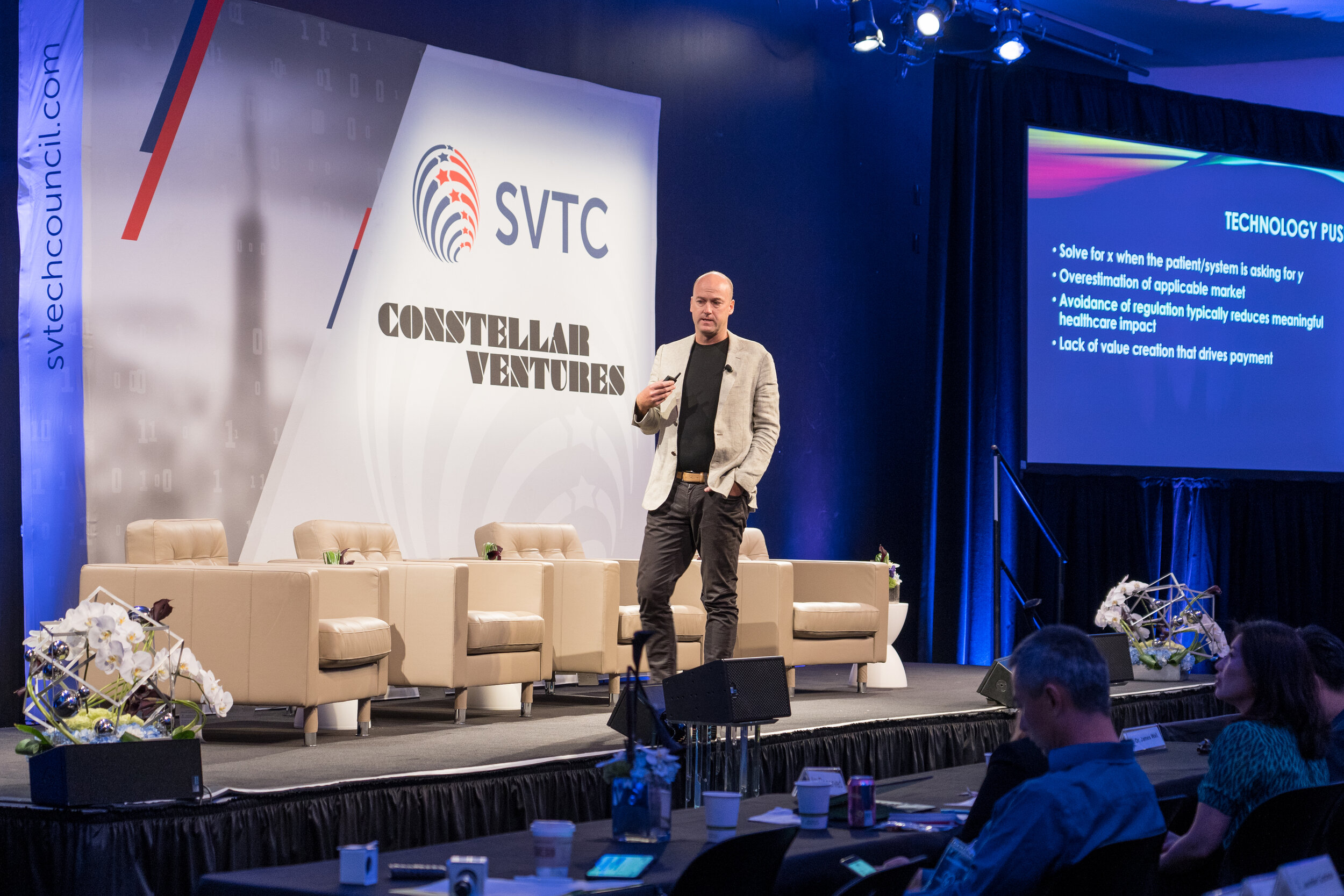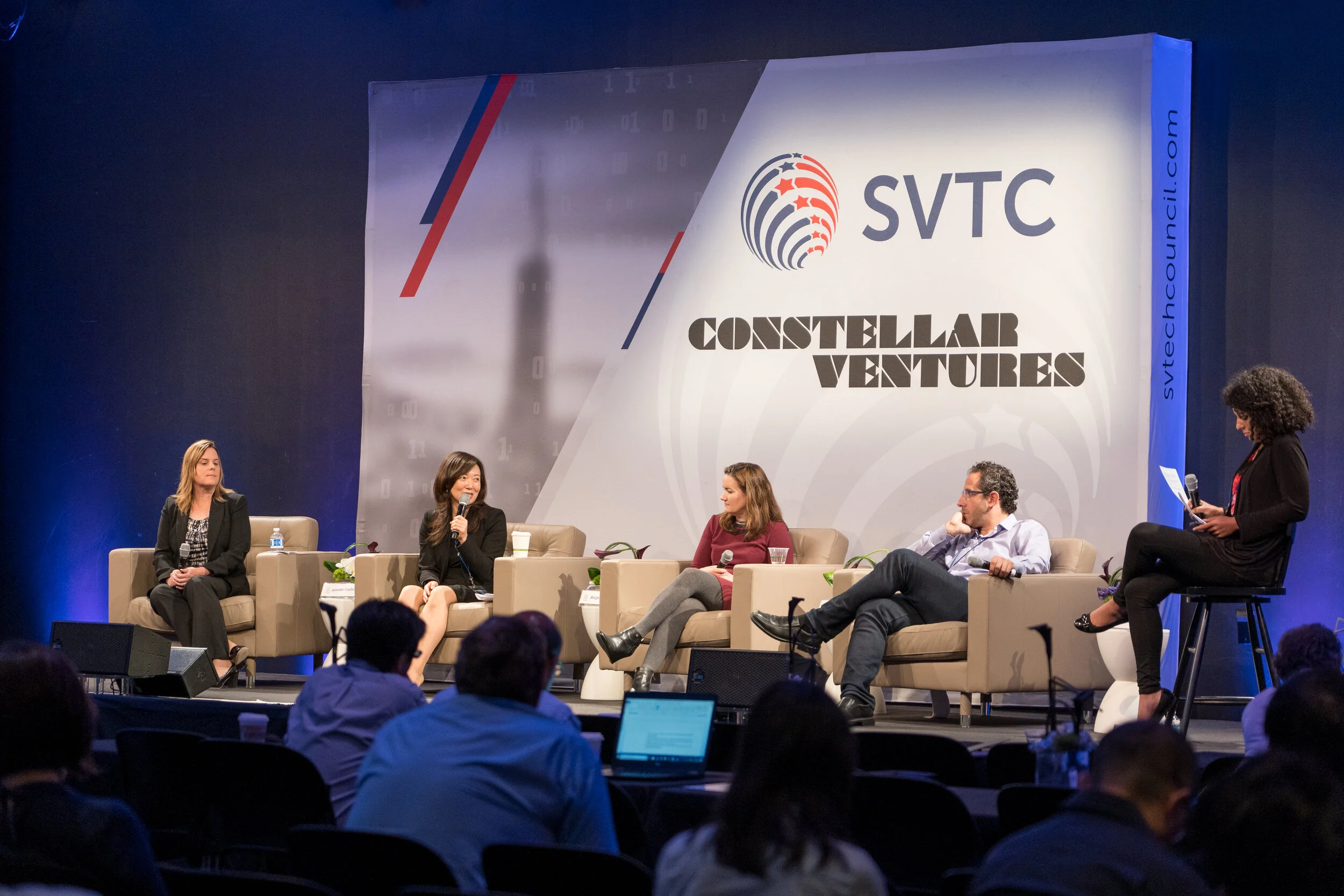Event Highlights from #Healthtech2019: AI + Healthtech: Is there money in it? Hear from top VCs and stellar startups!
This September, Constellar Ventures hosted its third annual Science and Technology Forum at the venerable Computer History Museum in Mountain View, CA. This year’s theme was “AI + HealthTech”, a topic on which we invited discussion from keynote speakers and top VCs in the industry on how AI and technology can spur development in and even disrupt the traditional healthcare industry. We had over 300 attendees, including industry specialists and distinguished experts in healthcare and technology. Below, we will take a look back at the highlights from this year’s conference.
Early Friday September 27th morning, Constellar Ventures team arrived at the museum, where they began setting up for the upcoming forum. In fact, preparation had begun as early as a year earlier, with time and energy dedicated to ensuring the smooth running of the conference and the provision of gathering top notch speakers, necessary material resources, and information for attendees.
#Healthtech2019: AI + HealthTech
For this year’s forum, we invited 17 Silicon Valley-based veterans from biomedical science and technology fields as speakers, including Dr. James Wall of Stanford University; Jeff Herbst, Vice President of Business Development and Head of NVIDIA’s GPU Ventures; and Alireza Masrour, Head of Venture of Plug and Play.
The eight-hour conference was filled with lively discussion among the speakers, earning appreciative applause from the audience and sparking many conversations after the panels. The conference kicked off with opening speech from Constellar Ventures’ General Manager Ms. Judy Lee welcoming attendees and introducing Constellar Ventures as the host of the conference.
Technology + Healthcare Services: How does technology enable better, more affordable, and more efficient healthcare?
The conference kicked off with an opening keynote given by Dr. James Wall, Director of Stanford University’s Byers Center for Biodesign, in which he explained the impact of today’s technological development on traditional health industries from the perspective of doctors and professors.
Science and technology, Dr. Wall believes, will be one of the greatest driving forces in promoting the reform of medical care. Through the integration of data, connectivity, and computing power, more efficient and more personalized medical care can be enhanced. Most importantly, these developments must be combined with value to achieve the result of providing better services at a lower cost.
AI + Diagnostics: How Will AI Technology Impact Medical Diagnosis?
The first panel was moderated by Lake Dai of LDV Partners, a Silicon Valley venture capital fund, and revolved around health technology and medical diagnosis. The panelists agreed that compared to other fields of medicine, the field of medical diagnosis will feel the greatest impact from the disruptive innovation of AI technology.
Diagnosis involves analyzing patient information and data, so the issue of gathering comprehensive patient data has always been at the forefront of the field. As the discipline of big data develops more and more, it begins to show its applications to the process of medical diagnosis. Given its ability to process information at high speeds, AI technology can thus have the greatest impact on the way diagnosis has traditionally been performed.
Savan Devani, CEO of a stellar startup, BioTrillion, also one of our portfolio companies, explained that medicine is moving away from treatment and towards prevention and early intervention. Through the acquisition and analysis of big data, we can gain a more comprehensive understanding of patients and their diseases; from there, patients can receive treatment earlier.
AI + BioPharma What is the Relation Between Health Technology and Biopharmaceuticals?
For the second panel, speakers discussed how technological developments could spur the development of biopharmaceuticals. Dr. Jennifer Cochran, Department Chair and Professor of Bioengineering at Stanford University, kicked the panel off with a primer on the opportunities and challenges faced by traditional pharmacy. Traditional biopharmaceuticals is both time-consuming and costly. From drug discovery to drug development, pre-clinical trials to approval from the Food and Drug Administration before finally entering mass production, the process of developing biopharmaceuticals usually takes seven to ten years and costs $2.6 Billion USD.
Dr. Cochran believes that AI as a tool can shorten this process and improve efficiency to a certain extent, but despite this, there are still many challenges left to face. In addition to the difficulties in data preparation, technological research, and development, there are production and regulatory issues that can only be resolved through the combined effort of various disciplines. There appears to be a long way to go before we can develop drugs using AI technology, but we expect to see the first drug developed by AI in the near future.
From left to right: Lise Feng, Frank Caufield, Calvin Chin, Alex Kolicich
Healthtech + VC: How do Venture Investors View the Current State & Development of Medical Technology?
The first afternoon panel featured Calvin Chin, partner of E14 Fund, taking the lead in sharing his views on the promising investment opportunities in health technology, believing that attention should be paid to start-up companies collecting medical data. This precise data obtained through professional hardware will have a significant impact on all aspects of the medical profession. In addition, foundational fields of biological research and development, such as high-performance computing, robots, and laboratory automation are also full of investment opportunities.
8VC Managing Partner Alex Kolicich discussed the difficulty of changing the traditional medical system directly through science and technology, preferring integration as a way to enter healthtech investment. Many of these early designed medical systems cannot meet the current demand for data collection and utilization. However, technological developments can lead to the creation of medical products and services for a low cost and high gross profit that can be bundled and sold to hospitals or other medical institutions.
Finally, Frank Caufield, a partner of Darwin Ventures, with decades of venture capital and business operation experience under his belt, agreed with the other two panelists. He added that he was optimistic about investing in traditional areas such as healthcare, pharmaceutical drugs, and insurance, because these existing industries are mature and ready for innovation and disruption. With this insight from these investors, do you have any new business ideas? If you ever need financing, don’t forget to approach Constellar Ventures about it, since we focus on early investment.
Healthtech + Future: The Prospects of Medical Science and Technology and How to invest in it.
For the last panel of this year’s forum, we invited three early investors who focus on the field of healthtech to share their views on the future of healthtech from the perspective of venture capitalists and financial investors.
Alireza Masrour, Head of Ventures of Plug & Play, said that the trend is moving towards the accumulation of information from hospitals, clinics, and doctors into a central location for management. Startups can then provide services to monitor and analyze this information, find problems, and offer optimizing solutions.
CEO & Founder of LaunchPad Digital Health, Fred Toney, believes that future medical tech companies will develop towards value-based medical solutions, delivering better medical results and lower costs to customers.
Jeff Herbst, Vice President of Business Development and Head of Nvidia GPU Ventures, agrees with Toney’s assessment, expressing that the current medical system is in the stage of simply letting doctors treat patients. In the future, there will be more technology, methods, or new medical systems to encourage doctors to focus on preventative care. After all, it is better to prevent an illness than to treat an existing one.
This year’s forum was full of lively dialogue and insightful discussions, many of which, unfortunately, cannot be conveyed here. We will continue publishing articles summarizing and analyzing topics from the forum, as well as reports from other relevant forums from time to time. If you are interested, we invite you to follow us on our social media.






